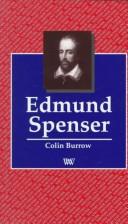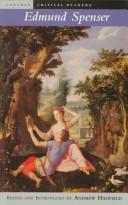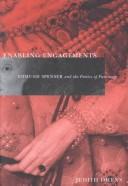| Listing 1 - 10 of 34 | << page >> |
Sort by
|
Book
ISBN: 0091093902 0091093910 Year: 1971 Publisher: London : Hutchinson university library,
Abstract | Keywords | Export | Availability | Bookmark
 Loading...
Loading...Choose an application
- Reference Manager
- EndNote
- RefWorks (Direct export to RefWorks)
Spenser, Edmund, --- Criticism and interpretation. --- Immerito, --- Spencer, Edmund, --- Spenser, Edmond,
Book
ISBN: 1316870073 131621866X 1316869725 1107094534 1107476577 Year: 2017 Publisher: Cambridge, England : Cambridge University Press,
Abstract | Keywords | Export | Availability | Bookmark
 Loading...
Loading...Choose an application
- Reference Manager
- EndNote
- RefWorks (Direct export to RefWorks)
Edmund Spenser's poetry remains an indispensable touchstone of English literary history. Yet for modern readers his deliberate use of archaic language and his allegorical mode of writing can become barriers to understanding his poetry. This volume of thirty-seven essays, written by distinguished scholars, offers a rich introduction to the literary, political and religious contexts that shaped Spenser's poetry, including the environment in which he lived, the genres he drew upon, and the influences that helped to fashion his art. The collection reveals the multiple personae that Spenser constructs within his work: to read Spenser is to read a rich archive of literary forms, and this volume provides the contexts in which to do so. A further reading list at the end of the volume will prove invaluable to further study.
Spenser, Edmund, --- Criticism and interpretation. --- Immerito, --- Spencer, Edmund, --- Spenser, Edmond,

ISBN: 0746307500 0746307721 1786942666 Year: 1996 Publisher: Plymouth, U.K. : Northcote House in association with the British Council,
Abstract | Keywords | Export | Availability | Bookmark
 Loading...
Loading...Choose an application
- Reference Manager
- EndNote
- RefWorks (Direct export to RefWorks)
An account of the life and poetic career of the greatest Elizabethan poet.
Spenser, Edmund, --- Criticism and interpretation. --- Immerito, --- Spencer, Edmund, --- Spenser, Edmond,
Book
ISBN: 0710069537 Year: 1971 Publisher: London : Routledge & K. Paul,
Abstract | Keywords | Export | Availability | Bookmark
 Loading...
Loading...Choose an application
- Reference Manager
- EndNote
- RefWorks (Direct export to RefWorks)
Spenser, Edmund --- Spenser, Edmund, --- Criticism and interpretation. --- -Criticism and interpretation --- Immerito, --- Spencer, Edmund, --- Spenser, Edmond,

ISBN: 0140801049 Year: 1969 Publisher: Harmondsworth : Penguin Books,
Abstract | Keywords | Export | Availability | Bookmark
 Loading...
Loading...Choose an application
- Reference Manager
- EndNote
- RefWorks (Direct export to RefWorks)
Spenser, Edmund, --- Criticism and interpretation. --- Immerito, --- Spencer, Edmund, --- Spenser, Edmond, --- Spenser (edmund), 1552?-1599

ISBN: 0582247357 0582247365 Year: 1996 Publisher: London Longman
Abstract | Keywords | Export | Availability | Bookmark
 Loading...
Loading...Choose an application
- Reference Manager
- EndNote
- RefWorks (Direct export to RefWorks)
Spenser, Edmund, --- Immerito, --- Spencer, Edmund, --- Spenser, Edmond, --- Criticism and interpretation. --- Spenser (edmund), 1552?-1599 --- Spenser, Edmund
Book
ISBN: 9781139814652 9781107038202 9781107559431 9781107250512 110725051X 1139814656 1107038200 9781107248021 1107248027 110755943X 1107241847 1139889834 1107251346 110724885X 1107249686 1299772684 Year: 2013 Publisher: Cambridge : Cambridge University Press,
Abstract | Keywords | Export | Availability | Bookmark
 Loading...
Loading...Choose an application
- Reference Manager
- EndNote
- RefWorks (Direct export to RefWorks)
Why did Spenser write his epic, The Faerie Queene, in stanzas instead of a classical meter or blank verse? Why did he affect the vocabulary of medieval poets such as Chaucer? Is there, as centuries of readers have noticed, something lyrical about Spenser's epic style, and if so, why? In this accessible and wide-ranging study, David Scott Wilson-Okamura reframes these questions in a larger, European context. The first full-length treatment of Spenser's poetic style in more than four decades, it shows that Spenser was English without being insular. In his experiments with style, Spenser faced many of the same problems, and found some of the same solutions, as poets writing in other languages. Drawing on classical rhetoric and using concepts that were developed by literary critics during the Renaissance, this is an account of long-term, international trends in style, illustrated with examples from Petrarch, Du Bellay, Ariosto and Tasso.
Spenser, Edmund, --- Immerito, --- Spencer, Edmund, --- Spenser, Edmond, --- Criticism and interpretation. --- Arts and Humanities --- Literature

ISBN: 1282860240 9786612860249 0773569979 9780773569973 0773523316 9780773523319 Year: 2002 Publisher: Montreal ; Ithaca : McGill-Queen's University Press,
Abstract | Keywords | Export | Availability | Bookmark
 Loading...
Loading...Choose an application
- Reference Manager
- EndNote
- RefWorks (Direct export to RefWorks)
Enabling Engagements contributes to current critical debates regarding early modern subjectivity and early modern cultural capital. In stressing the boldness of Edmund Spenser's poetics of patronage, Judith Owens shows that Elizabethans could and did exercise agency within a wide range of institutions. By consistently challenging assumptions of courtly hegemony in early modern society, Owens suggests a new appraisal of the processes of cultural commodification. Enabling Engagements challenges conventional assessments of Spenser as court-centred and of patronal relations in the early modern period as asymmetrical and prescriptive. Owens demonstrates that Spenser exercised a vigorous sense of agency within the close quarters of patronage and courtly culture, fashioning his laureate's role and envisioning nationhood in resistance to the centre. She shows that his independence from court-centred values and tropes informed his poetics from the start of his publishing career, not just as a result of increasing disillusionment with the court. Owens develops detailed readings of Spenser's poetry and his paratextual material in The Shepheardes Calender, the 1590 Faerie Queene, and Complaints, providing contexts that are both broader and more varied than those usually accorded Spenser's poetry. She extends the horizons of The Faerie Queene in particular to include not only court and sovereign but also London, the material conditions of early modern publishing, and Ireland. Bringing together concerns usually approached individually, she shows us a Spenser who is neither the careerist of much recent criticism nor the Elizabethan propagandist of long-standing custom.
Authors and patrons --- Literary patrons --- History --- Spenser, Edmund, --- Immerito, --- Spencer, Edmund, --- Spenser, Edmond, --- Authorship. --- Relations with literary patrons.
Book
ISBN: 0582315123 0582315115 9780582315129 Year: 1978 Publisher: London: Longman,
Abstract | Keywords | Export | Availability | Bookmark
 Loading...
Loading...Choose an application
- Reference Manager
- EndNote
- RefWorks (Direct export to RefWorks)
Poets, English --- Biography --- Spenser, Edmund, --- Ecrivains anglais --- Biographies. --- Immerito, --- Spencer, Edmund, --- Spenser, Edmond, --- Spenser, Edmund --- Poets, English - Early modern, 1500-1700 - Biography --- Spenser, Edmund, - 1552?-1599
Book
ISBN: 0691063060 132288367X 0691617139 0691644284 1400870240 0691100438 9781400870240 9780691617138 9780691644288 9780691100432 Year: 1976 Publisher: Princeton, New Jersey : Princeton University Press,
Abstract | Keywords | Export | Availability | Bookmark
 Loading...
Loading...Choose an application
- Reference Manager
- EndNote
- RefWorks (Direct export to RefWorks)
Isabel MacCaffrey contends that, in allegory, the mind makes a model of itself, and she shows that The Faerie Queene, mirroring as it does the mind's structure, is both a treatise on and an example of the central role that imagination plays in human life.Viewing the poem as a model of Spenser's universe, the author investigates the poet's theory of knowledge and the role of imagination in the construction of cosmic models. She begins with a survey of theories of the imagination and the creation of fictions, establishing a context in which allegorical images may be understood throughout the European allegorical tradition to which The Faerie Queene belongs. Isabel MacCaffrey's new readings show that insofar as Spenser's poem concerns modes of knowledge, it offers the reader an anatomy of its own composition, an analysis of imagination in its varied relations to the world.Originally published in 1976.The Princeton Legacy Library uses the latest print-on-demand technology to again make available previously out-of-print books from the distinguished backlist of Princeton University Press. These editions preserve the original texts of these important books while presenting them in durable paperback and hardcover editions. The goal of the Princeton Legacy Library is to vastly increase access to the rich scholarly heritage found in the thousands of books published by Princeton University Press since its founding in 1905.
Immerito, --- Spencer, Edmund, --- Spenser, Edmond, --- Allegory. --- Spenser, Edmund, --- Epic poetry, English --- Personification in literature --- Symbolism in literature --- History and criticism. --- Technique. --- Spenser, Edmund
| Listing 1 - 10 of 34 | << page >> |
Sort by
|

 Search
Search Feedback
Feedback About UniCat
About UniCat  Help
Help News
News